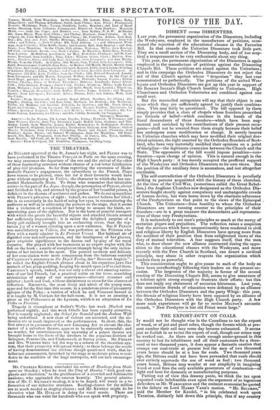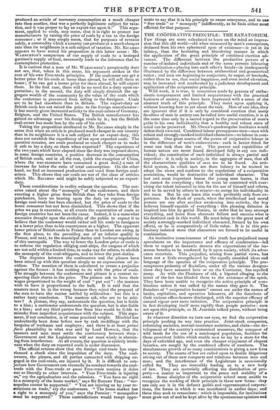THE EXPORT-DUTY ON COALS.
IT would not be thought wise in the Canadians to tax the export of wood, or of pot and pearl ashes, though the forests which at pre- sent cumber their soil may some day become exhausted. It seems just as foolish in us to tax the export of coal, though our mines may be worked out. As there are coals enough under-ground in this country to last its inhabitants and all their customers for a thou- sand or two thousand years, it does appear a fantastic caution that cramps our coal-trade at present lest the men of two thousand years hence should be at a loss for coals. Two thousand years ago, the Britons could not have been persuaded that coals should ever entirely supersede the use of wood as fuel : two thousand years hence, Britons may wonder at our simplicity in imagining wood or coal fires the only available generators of combustion—of light and heat for domestic or manufacturing purposes.
Putting out of view this dreamy panic, we think the tax upon exported coals indefensible even upon the argument of so ingenious defenders as Mr. WaanusTois and the eminent economist he quoted in the debate on Lord HARRY VANE'S motion. " Mr. Ricaano," said the Member for Kendal, "in his celebrated work upon Taxation, distinctly laid down this principle, that if any country produced an article of necessary consumption at a much cheaper rate than another, that was a perfectly legitimate subject for taxa- tion, and it e as proper to lay an export-tax upon it." This argu- ment, applied to coals, may mean, that it is right to protect our manufacturers by raising the price of coals by a tax to the foreign consumer ; or it may simply mean, that for purposes of revenue solely, a commodity which a country can produce at a much cheaper rate than its neighbours is a safe subject of taxation. Mr. RICARDO appears to have stated his proposition in this latter sense : Mr. WARBURTON'S comparison of our supply of coals to a besieged garrison's supply of food, necessarily leads to the inference that he contemplates protection.
It is curious that a man of Mr. WARBURTON'S perspicacity does not see, that, taken in this sense, his argument strikes at the root of his own Free-trade principles. If the coalowner can get a better price for his coals at home than abroad, he will sell them at home ; if he can get a better price for them abroad, he will export them. In the first case, there will be no need for a duty upon ex- portation; in the second, the duty will simply diminish the ag- gregate wealth of the community by the value of the coals which the coalowner is prevented from selling to the foreigner. Coals are to be had elsewhere than in Britain. The export-duty on British coals has not raised the price to the foreign manufacturer : it has merely given increased activity to the coal-mines of Germany, Belgium, and the United States. The British manufacturer has gained no advantage over his foreign rivals by it ; but the British coal-owner has made less by the sale of his coals. Taking the proposition attributed to Mr. RICARDO simply in the sense that when an article is produced much cheaper in one country than in its neighbours it is a safe subject for an export-duty, this does not establish the expediency of tax upon exported coals. The question remains, are coals produced so much cheaper as to make it safe to lay a duty on them when exported ? The experience of the two years which have elapsed since the duty was imposed shows, in some foreign countries, a positive decrease in the consumption of British coals, and in all the rest, (with the exception of China, where the war-steamers have consumed a great deal,) a rate of increase far below the ratio of total consumption. On the other band, we find an increased production and vend from foreign coal- mines. This shows that our coals are not of the class of articles which Mr. Rie.tano said might be safely subjected to an export- cluty.
These considerations in reality exhaust the question. The out- cries raised about the " monopoly " of the coalowners, and their exacting a higher price from British than they take from foreign purchasers, have no bearing upon the duty on exports. The foreign coal-trade has been checked, but the price of coals to the home consumer has not been diminished. This shows that if the price we pay is excessive, at all events the exportation of coals to foreign countries has not been the cause. Indeed, it is a somewhat excessive draught upon the credulity of the public to expect it to believe that the coalowner would rather sell his coals to foreigners at a lower price than to his countrymen at a higher. The apparent lower prices of British coals in France than in London are owing, in the first place, to the prevailing use of an inferior quality in France, and next, to the municipal duties and harbour-regulations of this metropolis The way to lower the London price of coals is to enforce the regulation obliging coal-ships, the cargoes of which are not sold within a limited time, to make way for others, to abolish the monopoly of the coal-whippers, and to lower the port-duties.
The disputes between the coalmasters and the pitmen have been mixed up with this question simply as an argumentum ad in- vidiam. The mention of them is calculated to create a prejudice against the former : it has nothing to do with the price of coals. The struggle between the coalowners and pitmen is a contest re- specting their shares in the price. The pitmen ask to have their wages proportioned to the weight of coal " put out" : the masters wish to have it proportioned to the bulk. It is said that the masters must be in the wrong because they reject the proposal of the men to have the matter settled by arbitration : but this is a rather hasty conclusion. The masters ask, who are to be arbi- ters? A pitman, they say, understands the question, but is liable to a bias; a coalmaster understands the question, but is also liable to a bias ; and any third parties free from bias would be liable to mistake from imperfect acquaintance with the subject. This argu- ment, if not conclusive, is of some practical weight. Mischief has undoubtedly been done before now by rash meddlings with the bargains of workman and employer; and there is at least prima facie plausibility in what was said by Lord Howrex, that the masters and men must settle the controversy between them : Government and the Legislature will act most wisely in abstain- ing from interference. At all events, the question is entirely irrele- vant when the duty on exported coals is under discussion.
The official returns show that the foreign coal-trade has expe- rienced a check since the imposition of the duty. The coal- owners, the pitmen, and all parties connected with shipping en- gaged in the coal-trade, are injured by it. It is difficult to con- jecture how Government can reconcile its conduct towards the coal- trade with the Free-trade or quasi Free-trade maxims it doles out so liberally to other interests. " Your Free-trade is injuring
us," cry the agriculturists and the colonists. "You have no right to a monopoly of the home market," says Sir ROBERT PEEL: "mo-
nopolies cannot be supported." " You are injuring us by your re- strictions on trade," cry the coalowners. "The home market has a right to a monopoly of you," says the Premier : "monopolies Must be supported." These contradictions would tempt oppo-
nents to say that it is his principle to cause annoyance, and to use "free trade" or " monopoly " indifferently, as he finds either most efficient for that purpose.



























 Previous page
Previous page